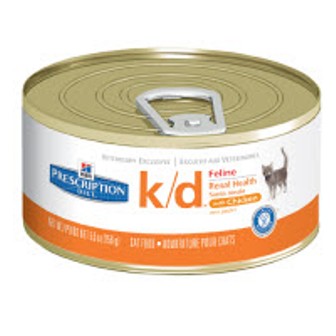Best Cat Food for Kidney Disease
"To purchase cat food for kidney disease look no further than your veterinarian or get a prescription that you can use in an online store (see below). Canned foods are preferred to dry due to the higher moisture content. Foods need to contain high quality meat protein and low levels of phosphorous."
There is much debate about the best cat food for kidney disease. Some "experts" say you should feed a low protein diet, while other "experts" say a normal diet is acceptable or even desirable. It's hard to know whom to believe. Both sets of experts have studies to back up their claims. So what is a cat owner to do?
Well, first it depends on what kind of kidney problem your cat has.
Diet for Cat with Kidney or Bladder Stones
If your cat has kidney or bladder stones, the answer is easy. The experts actually agree on this one. There are many types of kidney stones. Most common are struvite stones, which are made of magnesium ammonium phosphate. A special cat food for kidney disease is very useful in treating these stones. Feeding a diet that contains lower than normal amounts of protein, magnesium, and phosphorus is key. Less protein means less urea, and therefore less ammonium. Remember that struvite stones are made of magnesium ammonium phosphate. Lowering the amounts of these materials makes the formation of stones less likely. Prescription diets usually also contain more salt than normal, which causes cats to drink more water, which flushes out the bladder.
Diet for Cat with Acute Kidney Disease
Now, if your cat has acute kidney disease, she's not going to feel much like eating anyway. A low protein, low phosphorus cat food for kidney disease will be easy on her kidneys, but if she doesn't like the diet, if you can get her to eat her regular food, that will be better than nothing. She should recover soon and hopefully will have no lasting kidney damage.
Diet for Cats with Chronic Kidney Disease
Clinical studies support the benefits of dietary change for cats with Chronic Kidney Disease (CKD). It extended the survival time of cats that did change diets 2.5 times vs. those that did not change their diets. Since cats are very picky, dietary changed often needs to be gradually introduced.
Most veterinarians believe that cats with kidney disease should have low phosphorus diets, but they disagree about the amount of protein. On one hand, a low protein diet is supposed to decrease the work load on the kidneys because they have less protein waste to process. These diets derive more of their energy from fats and carbohydrates, which are supposed to be less taxing on the kidneys. On the other hand, a diet of a normal amount of protein is supposed to keep your pet healthy, and the protein is not believed to cause a problem for the kidneys. Cats normally need a high protein diet. A moderate amount of high quality protein as recommended by your veterinarian may be the best course of action.
Your cat should be given canned foods due to the higher moisture content. Diets that require a prescription that are made for cats with kidney problems include Eukeanuba MultiStage Renal, Purina Veterinary NF, Hill's Prescription Diet k/d and Royal Canin Modified Formula or Renal LP 21.
In consultation with your veterinarian you might want to consider feeding your cat a home made diet consisting of a high quality ground raw meat such as rabbit or chicken thigh plus supplements.
Dietary Supplements for Cats with Kidney Problems
Some owners like to supplement their cat's diet with natural supplements designed to support kidney health. Ingredients such as burdock and dandelion have a history of helping urinary tract health and the natural production of certain hormones. Pet Alive Kidney Support is formulated for this purpose and is worth researching/discussing with your veterinarian.
Sources
Chronic Kidney Disease and Uremia in Dogs, Cats, and FerretsHines, Ron DVM
Treating Feline Kidney Disease: an Evidence-Based Approach
D. Polzin
College of Veterinary Medicine
University of Minnesota
From Cat Food
for Kidney Disease to More on Cat Kidney Problems
To Cat Health Guide Home
